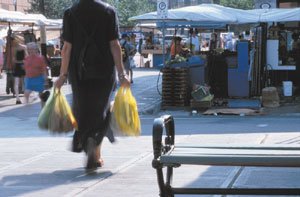It’s a rainy weekday afternoon at Festival Flea Market in
Pompano Beach, Fla.,and the parking lots are packed, with snowbird
motorists resorting to stealing parking spaces.
Hilary Lehman – McClatchy Newspapers
It’s a rainy weekday afternoon at Festival Flea Market in Pompano Beach, Fla.,and the parking lots are packed, with snowbird motorists resorting to stealing parking spaces.
The bargain hunters are out in force.
Erin Stewart from New Britain, Conn., was one of those shoppers, visiting the flea market on her spring break.
She gestured at the abundant merchandise around her to explain why she was taking a day off from the beach.
“Well, I’m in college, and I’m broke to begin with,” she said. “I’m the biggest clearance shopper you’ve ever met in your life.”
It would seem that discount destinations like flea markets should be immune from the recession’s effects, and managers of several local flea markets say that business is better than ever.
But stroll around the venues and talk to individual vendors and you’ll hear complaints. The recession has hit them, too, though some say not as hard as it might have. They are keeping up, but sometimes just barely.
Preston Henn, who has owned the Fort Lauderdale Swap Shop since the 1960s, said business has never been better. People are looking for bargains, he said, and more people are renting booths.
Mark Hintz, the general manager of the Festival Flea market, said their parking lots are packed every day of the week, and that business was booming.
But many of the vendors say business is bad, although not as a result of reduced foot traffic.
Jewelry vendors at discount malls said they are hit especially hard by the dearth of expendable income.
Owner Mike Baid of Laurence & Co. jewelry at Festival Flea Market said that business isn’t great, but it’s not awful, either. When the economy dips, he said, people stop buying luxury items like jewelry first. It’s starting to look up, Baid said: February was better than December.
At the US-1 Discount Mall near Miami, Eddie Mabardi, owner of Mabardi’s Jewelry, said he can barely make a sale. It’s not a decrease in foot traffic that’s the problem, he said. People just don’t have the money to spend on jewelry, no matter how much he drops the price – a pair of earrings can cost from $10 to $100, depending on the weight of gold, but none of it is selling, he said.
He hopes to stay afloat; all his life, he’s been a jeweler, and it’s the family business. He has no employees and does everything on his own. But paying $2,000 for rent a month for the space, he said, is making it harder to meet his expenses.
Vendors selling home decorating products are having trouble, too.
Jackie Lau, owner of Silk Flowers by Jackie at Festival Flea Market, said that the rocky home sales market has caused her own sales to drop. Her arrangements go from $7 for a small pot arrangement to a $300 decorative plant arrangement or a silk tree.
If houses aren’t selling, people aren’t buying floral arrangements to decorate, she said. All her pieces are selling about the same, regardless of price, she said, but people with 20-foot ceilings who might have once bought a 12-foot decorative tree are now looking at shorter shrubs.
Lau has branched out into other items such as bamboo shoots to navigate the downturn.
“Lucky bamboos are only a few dollars apiece, but it helps to generate some income,” she said.
It’s the height of flea market season, so she’s still busy despite the soft market, but she said working a minimum-wage job might make her more money. “I wouldn’t say that I’m going to turn a profit, but at least I’m surviving,” she said.
Furniture by Galaxy Furniture at Festival Flea Market owner Avi Advani said his sales of furniture – everything the furniture department of a major store would sell – are also down since a year and a half ago.
“Business is slow, that’s the common consensus,” he said.
Cynthia Cohen, president and founder of Miami-based retail consulting firm Strategic Mindshare, said retailers selling good-quality discount merchandise should gain customers in a recession.
People are more willing to hunt through racks to find a bargain, she said.
“(Retailers) like Ross and Marshall’s do very well in an economic downturn because consumers are looking for the value, and they’re not as willing to trade time for money,” she said.
However, low-quality merchandise being sold cheaply will suffer, she said. Since customers can get good deals at major discount chains like Wal-Mart, they might overlook “cheap” merchandise at places like flea markets.
“People want to spend $5 and get $10 worth of merchandise,” she said. “They don’t want to spend $5 and get $5 worth.”
Vendors who sell basic items, such as clothing, or traditional flea-market fare like souvenirs, said while sales haven’t been booming, they make a decent living.
BEAUTY SUPPLIES
Suzanne Fucci, who owns Cosmetics by Sue at the US-1 Discount Mall, said in her 14 years at the mall, the last three have been the lightest, but she’s still selling. Fucci said she thinks she’s buffered against ups and downs in the economy by selling Avon, which she described as “an economy product.”
There are as many people at the flea market these days, she said, but they aren’t spending as much.
She said business isn’t bad, but she doesn’t make as much as she did four or five years ago, without discussing details. She said she sometimes operates at a loss in a particular month, although she said she can afford to absorb it. She said a flea market is still a good place to work. Fucci said she’s seen more booths rented out recently, which she attributes to people losing their jobs and coming to work at the market. Booths at the discount mall start at $520 per month, mall management said.
CASH FLOW
When the wholesale business didn’t work out for Guisela Melgar, she decided to start selling at a flea market.
Melgar, who runs Ocean Souvenirs at Festival Flea Market, has been in business for 18 months, after the wholesale souvenir business she tried to start in 2006 gave her problems. Her wholesale clients weren’t paying her on time, she said, and she needed cash. So she turned to flea markets after researching where people were more likely to buy.
People are looking for bargains, she said, and she’s turning a profit now.
Even if she sells a $14 item for $12, she said it’s still worth it to have the money in hand. “For me, it’s better to give a good price but to have the money right (away),” she said.
PERSONAL TOUCH
Amy Cohen, who creates clothing for her Couture Tie-Dye business at Festival Flea Market, said her sales are better than when she used to sell to boutiques. Cohen, who is in her fifth month at the flea market, said she thinks being able to pitch her line directly to customers and making a custom product work to her advantage.
People realize her clothing isn’t cookie-cutter, she said, and her prices are “excellent compared to what they could be.” A long-sleeved tie-dyed T-shirt sells for about $24.
PICKY TOURISTS
Gurpreet Chhabra, who runs Professional Cosmetics at the Swap Shop, blamed the slowness of her business on a light tourism season. Snowbirds aren’t staying as long, either she said.
She said 2007 was the worst year she’s seen so far, but her sales – she wouldn’t quote exact figures – this year are about 20 percent down from 2008.
She’s happy just to be able to pay her bills, but it’s a trade-off between staying in business and being able to buy the inventory necessary to stay in business.
“If you pay your bills, you can’t buy the merchandise,” she said.
Martha Jeoncas, a winter Miami resident who spends most of the year in Montreal, Canada, and was at the Swap Shop on Wednesday morning, said that she was one of the shoppers who is just looking without any real intention to buy.
Bargains are more important to her these days because of the economy, she said, and if she sees something she likes, she would buy it – but all she had bought so far was a T-shirt.













